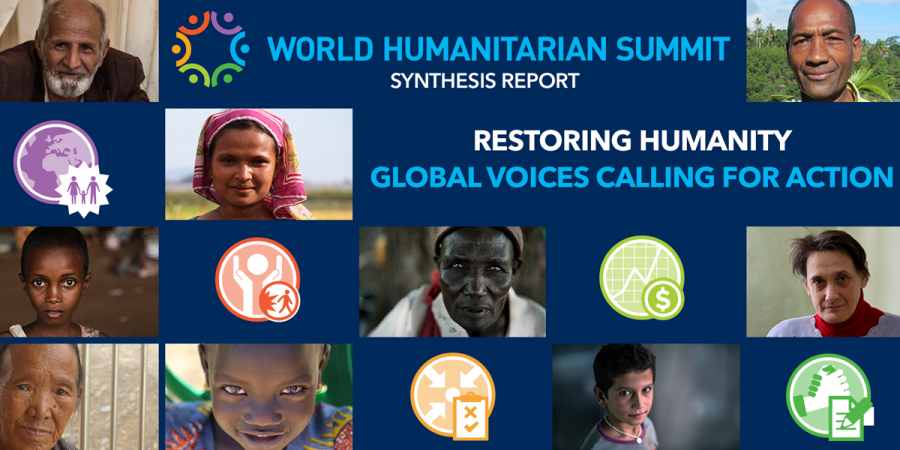Among the significant achievements of the World Humanitarian Summit (WHS) process to date has been to gather a body of evidence and perspectives on humanitarian aid from all corners of the globe and all walks of life that is unprecedented in its scale and richness.
Among the challenges for the WHS Secretariat has been to prepare a report that synthesizes this body of evidence and perspectives in a systematic and impartial way while remaining true to the multitude of voices heard during the process.
As part of its efforts to meet this challenge, the WHS Secretariat engaged the International Governance and Development Practices of Linklaters to conduct an independent review and analysis of the evidence gathered, with a view to helping ensure the integrity of the evidence base for, and fostering the legitimacy of, the WHS Synthesis Report.
Given the vast amount of information gathered during the WHS consultations, it was crucial to ensure that this information would be analyzed and incorporated into the Synthesis Report in a transparent, accountable and carefully evidenced manner. Linklaters’ expertise in governance made it a natural partner for the WHS Secretariat in ensuring that the Synthesis Report was a true reflection of its underlying evidence base.
Linklaters developed a tailored methodology to address the governance challenges of this project. We identified a new software capable of hosting and processing information in a variety of formats, from one-page submissions from affected individuals, to lengthy thought pieces by international NGOs. We created a novel methodology for reviewing documents which allowed reviewers to identify the multiple issues raised by each submission, highlight links between issues, and collect that information into digestible reports for the benefit of the Synthesis Report’s drafters. Finally, we assembled a multi-lingual team of attorneys and other legal professionals from various offices in Linklaters’ global network to execute this methodology, with multiple levels of review and quality control at each stage. All told, more than 20 attorneys and legal professionals (paralegals, legal technology support staff, and legal secretaries) contributed more than 3,300 hours to this project, over the course of several months.
Our Methodology
- First, the documents were uploaded into a database hosted by a legal technology company, Kira Systems, which partnered with us specifically for this project. Figure 1: Documents as uploaded into the Kira database.
- Then, a dedicated team of reviewers, all attorneys at Linklaters, read each document, highlighting all salient text and “tagging” it according to an issue framework developed in conjunction with the WHS Secretariat.
- Given the richness of the evidence base, content could be tagged as falling under multiple issues or sub-issues. In order to provide the flexibility for new ideas to be identified and brought forth during review, our reviewers were also trained to identify additional issues and sub-issues outside of the initial framework, which were then incorporated into the review protocol. Figure 2: In-progress tagging of documents within the Kira database
- We incorporated multiple levels of review and quality control into the process, which was designed to ensure a thorough and consistent outcome from the review.
- Once all the relevant content in the documents was tagged, the Kira database was used to generate reports containing all tagged text under each of the 82 identified sub-issues. These reports enabled the Synthesis Report’s drafters to read a single output of all text, across the hundreds of submissions, relevant to the particular issue or sub-issue of interest to them. Figure 3: Excerpt from the report for “Cash-based programming”
- Each document was also tagged with relevant identifying information such as stakeholder group, region and national context.
- The drafters of the Synthesis Report made use of these reports in evaluating support for, and critique of, the ideas raised during the WHS consultation process. The drafters also had access to the Kira database itself, permitting more targeted research on an ad hoc basis according to their needs over the drafting process.
- Linklaters provided editing support to the drafters of the Synthesis Report over various iterations of the draft, commenting on the use of the evidence base and issues of style.
- In partnership with Kira, Linklaters provided the space in which to host the massive number of online comments received by the Secretariat, which are being tagged and reviewed in an analogous process by UN volunteers.
Conclusion
Linklaters’ involvement facilitated the methodical, considered and consistent analysis of the thousands of pages of evidence underpinning the WHS Synthesis Report, providing a well-informed, independent perspective on the evidence base as a complement to the expertise of the Synthesis Report drafting team. Through this partnership, Linklaters was able to assist the WHS Secretariat in embedding good governance into this unprecedented multi-stakeholder process, ensuring that the information gathered would be organized, analyzed, and packaged in a transparent and accountable fashion.
The International Governance and Development Practices at Linklaters have also been privileged to play a number of other supportive roles during the WHS process, including as a member of the Regional Steering Group for the Europe and Others consultation; drafter of the Europe and Others region stakeholder analysis; and facilitator of ongoing projects on Islamic finance and private sector outreach.


Comments